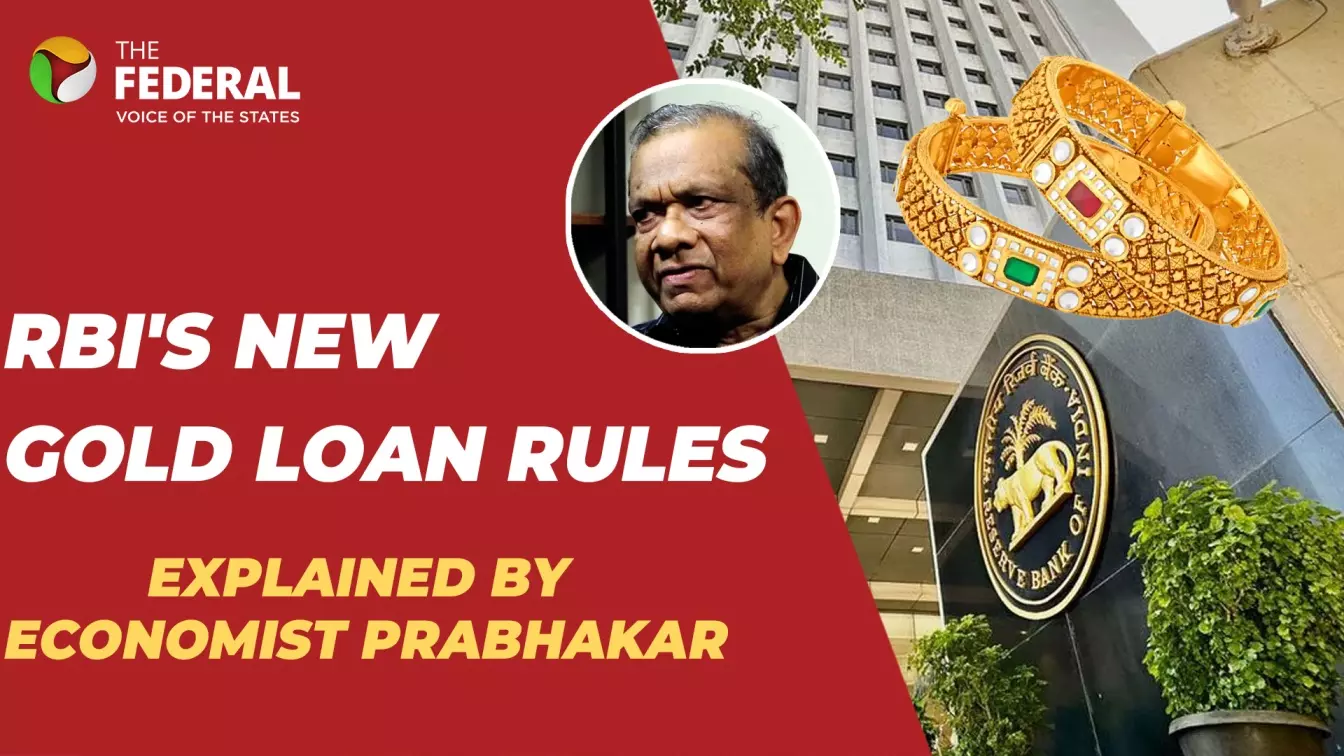
RBI’s new gold loan rules: Help or hassle? Economist Prabhakar explains
Did getting gold loans just get tougher? In this exclusive interview, economist K Prabhakar breaks down the RBI’s new draft guidelines for gold-backed loans

As gold loans surge across India, the Reserve Bank of India (RBI) has issued a new set of draft guidelines affecting both banks and NBFCs. But will these norms protect consumers—or punish them? In this special interview, The Federal's Pramila Krishnan speaks to economist K Prabhakar about what these changes mean for ordinary borrowers and why southern states are raising the loudest alarm.
Q: What do the new RBI guidelines mean for customers who pledge gold?
Prabhakar: There are several major changes. First, the maximum limit is now 1 kg of gold, which means by today’s prices, a customer can borrow up to ₹89 lakh. Second, the loan-to-value (LTV) ratio has been reduced to 75%. During COVID, it was 90%, then brought down to 80%, and now it’s 75%.
Another important change concerns purity. Only 22-carat gold will be considered—even if you pledge 24-carat gold. So, higher-value gold is being valued as lower-grade, which feels unfair. We don’t know the reason behind this, and it doesn’t seem to be based on any research.
Also read | TN leaders slam RBI's new gold loan norms, say it hits financial lifeline
Q: Why do you think RBI is bringing these rules now?
Prabhakar: One reason is the broader economic situation. For the last 10 years, salaries have grown only about 4%, while company profits have increased fourfold. People have no money. So, the only way to get cash is to pledge their gold. It’s a deeply negative sign for the economy. Gold is the only liquid asset left with people. The rise in gold loans shows people are struggling to pay bills. These new restrictions punish people who are already suffering, rather than addressing the root causes.
Q: But many banks have welcomed the new norms, saying it will increase transparency.
Prabhakar: That’s a knee-jerk reaction. Anything that adds paperwork makes bankers feel safe. But banks should exist to serve customers—not to burden them with forms. By doing this, banks are killing their golden goose. Customers may be driven away.
Q: So where will borrowers turn if banks become too restrictive?
Prabhakar: They'll go to moneylenders. These lenders don’t bother with paperwork—they might offer 80% LTV and charge high interest. But people will prefer them over these bureaucratic hurdles.
Q: Politicians in Tamil Nadu are opposing these guidelines. Why not other states?
Prabhakar: Southern states—Tamil Nadu, Kerala, Andhra Pradesh—have a long cultural history with gold loans. That’s why companies like Muthoot and Manappuram, based in Kerala, thrive here. Women often pledge gold for agriculture loans. That’s part of the tradition. North Indian media rarely highlights these concerns, so it seems like only Tamil Nadu is protesting.
Q: A study by Unimoney said gold loans are popular in Kerala, Tamil Nadu, Telangana, Maharashtra, and Punjab. How will the market react now?
Prabhakar: The formal market—banks—will shrink. NBFCs might gain some ground. But more dangerously, the informal market could grow. These guidelines are doing the opposite of their stated purpose. Instead of promoting transparency and formalisation, they’re pushing people back into the shadows.
Q: Will these rules reduce gold loan defaults?
Prabhakar: That’s misleading. Gold loan defaults aren’t like corporate defaults. Farmers aren’t Vijay Mallya. They don’t flee the country. Outstanding gold loans have doubled in the last year, but that’s because the business itself has grown by 103%. Naturally, if your loan book doubles, defaults will too. This basic logic seems to be missing from RBI’s thinking.
Also read | As gold prices zoom, TN sees surge in fake hallmark jewellery
Q: Why are banks now asking for gold ownership proof and usage purpose?
Prabhakar: They say it’s to protect lenders and borrowers. Yes, stolen gold can be pledged. But we already have strict KYC norms. I’ve had KYC verified three times at my bank. If stolen gold can still get past that, we have a bigger issue. This kind of monitoring will only discourage genuine customers.
The content above has been generated using a fine-tuned AI model. To ensure accuracy, quality, and editorial integrity, we employ a Human-In-The-Loop (HITL) process. While AI assists in creating the initial draft, our experienced editorial team carefully reviews, edits, and refines the content before publication. At The Federal, we combine the efficiency of AI with the expertise of human editors to deliver reliable and insightful journalism.

